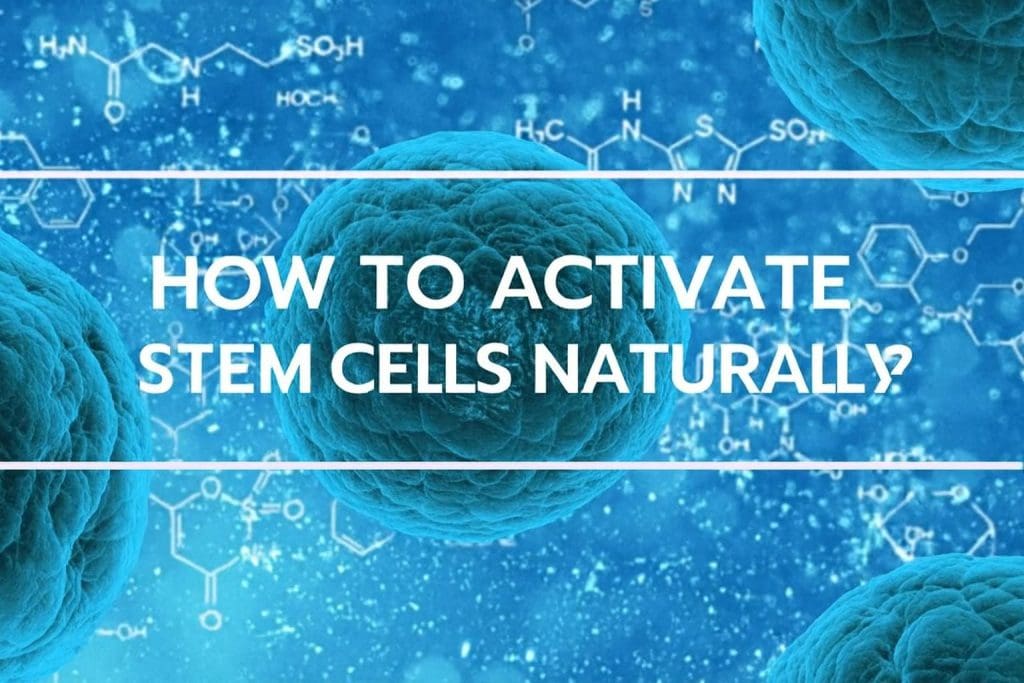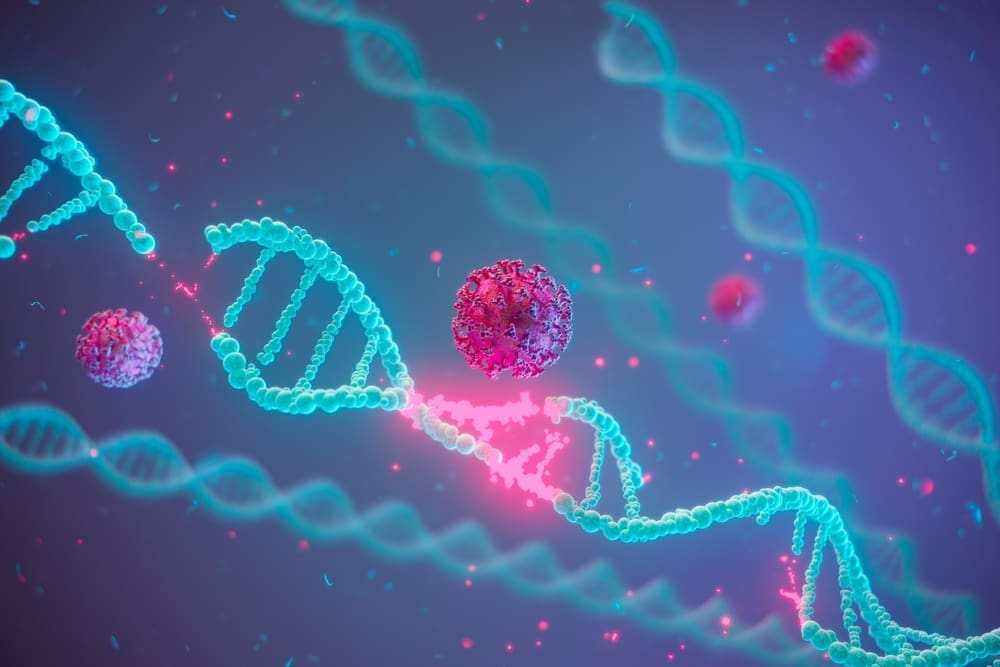Did you know our bodies have stem cells? These cells are the building blocks for all other cells in our body. As we get older, we have fewer and less effective stem cells. This makes it harder for our body to fix and grow new tissues.
This problem can cause many health issues. So, it’s important to find ways to naturally boost our stem cell health. By making lifestyle changes and using natural boosters, we can help our stem cells work better. This could improve our overall health and well-being.
Key Takeaways
- Understanding the role of stem cells in our body
- Recognizing the impact of aging on stem cell quantity and quality
- Exploring natural methods for stem cell activation
- Lifestyle changes that support stem cell health
- Natural boosters that can enhance stem cell function

What are Stem Cells and Their Importance
Stem Cells
Stem cells are key to our body’s repair work. They can turn into different cell types, helping to fix and keep tissues healthy. Stem cells are important because they replace cells lost to injury, disease, or just getting old. This helps keep us healthy and could help treat many illnesses. Alongside lifestyle changes and herbs that increase stem cells, supporting stem cell function can play a vital role in maintaining overall health.
Types of Stem Cells in the Human Body
There are mainly two kinds of stem cells: embryonic and adult. Embryonic stem cells are in early development and can become any cell. Adult stem cells, or somatic stem cells, are in adult tissues and help with repair and growth.
Adult stem cells are more relevant for natural repair. They include mesenchymal and hematopoietic stem cells. Mesenchymal stem cells can become bone, cartilage, and muscle cells. Hematopoietic stem cells make blood cells.
| Type of Stem Cell | Function | Location |
| Embryonic Stem Cells | Potential to become any cell type | Early developmental stages |
| Mesenchymal Stem Cells | Differentiate into bone, cartilage, muscle cells | Adult tissues (e.g., bone marrow, fat tissue) |
| Hematopoietic Stem Cells | Produce blood cells | Bone marrow |
Knowing about stem cells and their roles is key to understanding health and disease. By looking at adult stem cells, we can find natural ways to boost their activity and improve our health.
The Science Behind Natural Stem Cell Activation
Stem Cell Activation
Recent studies have shown how natural compounds can affect stem cells. This is key to unlocking stem cells’ potential for health and growth.
How Stem Cells Respond to Natural Compounds
Stem cells react to their surroundings, and natural compounds can change how they behave. For example, curcumin, found in turmeric, boosts stem cell activity by adjusting signaling pathways.
The way stem cells react to natural compounds is complex. Some compounds help stem cells grow, while others guide them to become specific cell types.
The Cellular Pathways Involved in Stem Cell Activation
Several key pathways are important for activating stem cells, like the Wnt/β-catenin pathway and the Notch signaling pathway. Natural compounds can tweak these pathways, affecting stem cell behavior.
Grasping these pathways is vital for creating natural ways to boost stem cell activity. Research has found natural compounds that can tweak these pathways, showing promise for treatments.
| Pathway | Natural Compound | Effect on Stem Cells |
| Wnt/β-catenin | Curcumin | Enhances proliferation |
| Notch Signaling | Ginsenosides | Promotes differentiation |
Measuring Stem Cell Activity in the Body
It’s important to measure stem cell activity to see how well natural compounds work. Tools like flow cytometry and quantitative PCR help assess this.
These methods give us clues on how natural compounds affect stem cells. This helps in finding better ways to activate stem cells.
Herbs That Increase Stem Cells: Nature’s Stem Cell Boosters

Certain herbs are being looked at as natural stem cell boosters. They offer new ways to improve health. These herbs have been used for centuries in traditional medicine.
Ginger and Turmeric: Powerful Anti-inflammatory Activators
Ginger and turmeric are known for their anti-inflammatory effects. Ginger helps activate stem cells with its antioxidants. Turmeric, with curcumin, also fights inflammation and may help stem cells.
A study showed curcumin boosts stem cell growth and development. This means eating turmeric could be good for stem cell health.
Ginseng and Astragalus: Traditional Stem Cell Enhancers
Ginseng and Astragalus are traditional herbs with adaptogenic properties. New research suggests they may also boost stem cell production. Ginseng, in particular, may improve health and wellness by enhancing stem cell activity.
| Herb | Potential Benefits | Traditional Use |
| Ginseng | Enhances stem cell activity | Adaptogenic properties |
| Astragalus | Supports immune system | Traditional Chinese medicine |
| Ginger | Anti-inflammatory effects | Aids digestion |
| Turmeric | Antioxidant properties | Anti-inflammatory |
Gotu Kola and Holy Basil: Adaptogenic Support for Stem Cells
Gotu Kola and Holy Basil are adaptogenic herbs that reduce stress. They may also support stem cell health by fighting oxidative stress and improving overall well-being.
Holy Basil has been studied for its stress-reducing effects. This can help support stem cell function indirectly.
Nutritional Approaches to Boost Stem Cell Production
Nutritional approaches are key to boosting stem cell production and overall health. Eating foods rich in essential nutrients and antioxidants helps keep stem cells healthy. It also supports their natural activation.
Foods Rich in Antioxidants That Support Stem Cells
Antioxidants protect stem cells from damage caused by oxidative stress. This damage can harm their DNA and function. Foods high in antioxidants include:
- Berries such as blueberries, strawberries, and raspberries, which are high in vitamins C and E.
- Leafy greens like spinach and kale, rich in lutein and zeaxanthin.
- Nuts and seeds, including almonds and sunflower seeds, which are good sources of vitamin E.
Essential Nutrients for Optimal Stem Cell Function
Some nutrients are crucial for stem cell health. These include:
- Omega-3 fatty acids found in fatty fish like salmon and sardines, which support cellular membrane integrity.
- Vitamin D, crucial for stem cell regulation and obtained through diet, sunlight, or supplements.
- Magnesium and zinc, minerals that play significant roles in numerous cellular processes, including those related to stem cell function.
Foods for Cellular Regeneration and Repair
Some foods also support cellular regeneration and repair. These include:
- Cruciferous vegetables like broccoli and cauliflower, which contain sulforaphane, a compound that supports cellular health.
- Green tea, rich in catechins, which may help in protecting stem cells and promoting their function.
- Fatty fish and other foods rich in omega-3 fatty acids, which not only support stem cell health but also aid in reducing inflammation.
By adding these foods to your diet, you can help support stem cell health. This may also improve their natural activation and function.
Fasting and Caloric Restriction for Stem Cell Activation
Fasting can greatly improve stem cell health by starting cellular cleaning processes. It’s also linked to better stem cell activation and health overall. This is thanks to caloric restriction.
How Intermittent Fasting Triggers Stem Cell Proliferation
Intermittent fasting alternates between fasting and eating. It boosts stem cell growth, helping repair and grow tissues. This happens because fasting stresses cells, which then start to grow more stem cells.
Different Fasting Protocols and Their Effects
There are many fasting methods, each affecting the body differently. Here are a few:
- 16/8 Method: Fast for 16 hours, eat in an 8-hour window.
- 5:2 Diet: Eat normally for 5 days, then limit calories to 500-600 on 2 days.
- Alternate Day Fasting: Alternate between eating normally and fasting days.
Each method impacts stem cell growth in its own way. This depends on how long and intense the fasting is.
| Fasting Protocol | Effect on Stem Cells | Potential Benefits |
| 16/8 Method | Stimulates stem cell proliferation | Improved tissue repair, enhanced autophagy |
| 5:2 Diet | Enhances cellular cleaning processes | Weight loss, improved insulin sensitivity |
| Alternate Day Fasting | Activates cellular pathways for regeneration | Increased longevity, reduced inflammation |
Safety Considerations and Who Should Avoid Fasting
Fasting is good for stem cells, but safety is key. Some people should not fast or should talk to a doctor first. These include:
- Pregnant or breastfeeding women
- Individuals with a history of eating disorders
- People with certain chronic illnesses like diabetes or heart disease
Always listen to your body and adjust your fasting plan if needed. This helps avoid any bad effects.
Exercise Strategies to Naturally Increase Stem Cells
Exercise is key to boosting stem cells naturally. It helps increase stem cell production, improving health and aiding in tissue repair.
High-Intensity Interval Training (HIIT) and Stem Cell Response
HIIT is a workout that alternates between intense exercise and rest. It boosts stem cell growth, especially for heart health. HIIT improves heart function and boosts natural repair by activating stem cells.
HIIT’s benefits for stem cells come from its ability to trigger growth factors. These factors help activate stem cells.
Strength Training for Muscle Stem Cell Activation
Strength training boosts muscle stem cells. It causes muscle fibers to tear, prompting stem cells to repair and rebuild.
This not only increases muscle mass and strength but also boosts muscle repair. Adding strength training to your routine can improve muscle stem cell function and health.
Low-Impact Exercise Options for All Fitness Levels
Low-impact exercises are great for all fitness levels. Yoga, Pilates, and brisk walking are examples. They support overall health and stem cell function.
| Exercise Type | Impact on Stem Cells | Benefits |
| HIIT | Stimulates stem cell proliferation | Improves cardiovascular health, enhances repair mechanisms |
| Strength Training | Activates muscle stem cells | Increases muscle mass and strength, improves regenerative capacity |
| Low-Impact Exercises | Supports overall health and potentially stem cell function | Adaptable to various fitness levels, promotes flexibility and balance |
Mixing different exercises can boost stem cell health and overall well-being.
Bone Marrow Stem Cell Enhancement Techniques
Our bone marrow’s health is key to making stem cells. It’s the spongy tissue in bones like hips and thighbones. Keeping it healthy boosts our overall well-being.
Natural Methods to Support Bone Marrow Health
There are natural ways to keep bone marrow healthy. Eating a balanced diet is essential. Foods like berries and leafy greens protect it. Drinking plenty of water also helps.
Exercise is also important. It makes bone marrow work better and boosts stem cell production. Yoga and tai chi improve health and support bone marrow.
Specific Nutrients That Boost Bone Marrow Stem Cells
Some nutrients are great for bone marrow stem cells. Vitamin D is key for healthy bone marrow. Foods like fatty fish and fortified dairy are good sources. Omega-3 fatty acids in fish oil and flaxseeds reduce inflammation.
Nutrients like iron and folate help make healthy blood cells. Eating iron-rich foods like red meat and spinach, and folate-rich foods like citrus fruits and beans, supports bone marrow.
Lifestyle Practices for Optimal Bone Marrow Function
Our lifestyle affects bone marrow health. Drinking too much alcohol and smoking harm it. Stress management through meditation helps too.
“A healthy lifestyle is the cornerstone of optimal bone marrow function. By making informed choices about diet, exercise, and stress management, individuals can significantly enhance their bone marrow health.”
By using natural methods, nutrients, and lifestyle practices, we can boost bone marrow health. This can increase stem cell production and improve our overall well-being.
Supplements That Support Stem Cell Function
Supplements are getting more attention for their role in supporting stem cells. People are looking to add these to their daily routine for better health. This is because research shows they can help support overall wellness.
Supplements are key in keeping stem cells healthy. Some nutrients help the body’s natural processes. This can make stem cells work better.
Vitamin D and Stem Cell Regulation
Vitamin D is important for stem cell function. Studies show vitamin D receptors in stem cells. This means vitamin D helps in their growth and division.
- Regulation of Stem Cell Fate: Vitamin D affects stem cell development by controlling genes.
- Immune System Support: It also boosts the immune system. A strong immune system is good for stem cells.
Omega-3 Fatty Acids and Cellular Health
Omega-3 fatty acids are vital for cell health, including stem cells. They have anti-inflammatory effects. This helps stem cells work better.
- Reducing Inflammation: Omega-3s lower chronic inflammation. This helps stem cells function well.
- Cell Membrane Integrity: They keep cell membranes strong. This is important for stem cell health.
Specialized Stem Cell Support Supplements
There are more supplements that support stem cells, besides vitamin D and omega-3s. These include:
- Cycloastragenol: Found in Astragalus, it may support stem cell health.
- N-Acetyl Cysteine (NAC): An antioxidant that supports cell health and may benefit stem cells.
Always talk to a healthcare professional before starting new supplements. Everyone’s needs and health are different.
Lifestyle Factors That Affect Stem Cell Health
Our lifestyle choices greatly impact our stem cells’ health. Stem cells help our body fix and grow new tissues. Knowing how lifestyle affects stem cells is key to staying healthy.
Sleep Quality and Stem Cell Regeneration
Sleep is vital for stem cell health. It helps the body fix cells, build bones and muscles, and boost the immune system. Bad sleep can harm stem cell function. Getting enough sleep and keeping a regular sleep schedule helps stem cells regenerate.
Adequate sleep is 7-9 hours for adults. A bedtime routine and a cool, dark bedroom can improve sleep quality.
Stress Management for Optimal Cellular Function
Too much stress hurts stem cell health. Stress makes cortisol, a hormone that can slow down stem cells. Doing stress-reducing activities like meditation or yoga can help.
Managing stress well supports stem cell health and overall well-being. Mindfulness and muscle relaxation are good techniques.
Environmental Factors That Impact Stem Cells
Environmental toxins harm stem cells. Pesticides, heavy metals, and plastics can mess with cell function. Using non-toxic household products and avoiding pollution can protect stem cells.
Eating a diet full of antioxidants also helps. Foods like berries and leafy greens support cell health.
Understanding and managing lifestyle factors can help keep stem cells healthy. This proactive approach supports overall health and natural repair.
Creating a 30-Day Stem Cell Activation Plan
Follow a 30-day plan to boost your stem cell production and health. This guide will help you activate your stem cells. You’ll learn about diet, exercise, fasting, and supplements.
Week 1: Foundation Building with Diet and Herbs
The first week sets the stage for stem cell activation. Start with a diet rich in antioxidants and nutrients. Add herbs like ginger, turmeric, and ginseng for their benefits.
- Eat lots of fruits, vegetables, and omega-3 fatty acids.
- Add ginger, turmeric, and ginseng to your meals.
- Drink plenty of water all day.
Week 2: Incorporating Exercise and Fasting Protocols
Week two introduces exercise and fasting to boost stem cells. Exercise and fasting can trigger stem cell activity.
- Start with yoga or brisk walking, then try HIIT.
- Try 16:8 or 5:2 fasting to activate stem cells.
- Adjust your workouts and fasting based on how your body feels.
Week 3: Adding Targeted Supplements
In week three, add supplements to support stem cells. Certain nutrients can boost stem cell production.
- Consider vitamin D, omega-3 fatty acids, and stem cell support formulas.
- Always talk to a healthcare professional before starting new supplements.
- Watch how your body reacts and adjust as needed.
Week 4: Fine-tuning Your Personal Approach
By week four, you’ve got a good start. Now, tailor your approach to fit your body and preferences.
| Aspect | Week 1 | Week 2 | Week 3 | Week 4 |
| Diet | Antioxidant-rich foods | Continue diet | Adjust based on response | Personalize nutrition |
| Exercise | None | Introduce exercise | Increase intensity | Customize workout |
| Fasting | None | Start intermittent fasting | Adjust fasting protocol | Optimize fasting schedule |
| Supplements | None | None | Introduce supplements | Adjust supplement regimen |
Follow this 30-day plan to create a stem cell activation routine that works for you. It will improve your overall health.
Conclusion
Activating stem cells naturally involves many steps. These include changing your diet, exercising, and making lifestyle changes. Herbs like ginger and turmeric, foods full of antioxidants, and intense workouts can help boost stem cell production.
Fasting and eating fewer calories can also trigger more stem cells to grow. Supplements like vitamin D and omega-3 fatty acids help stem cells work better. By using these methods, you can improve your health and feel better.
The best way to activate stem cells is with a detailed plan. A 30-day plan can help you focus on improving your stem cell health. This can lead to a better quality of life through natural stem cell activation.
What are stem cells and why are they important?
Stem cells can turn into different cell types. They help fix damaged tissues and keep the body healthy. They replace old or dying cells, keeping the body balanced.
How do herbs support stem cell health?
Herbs like ginger, turmeric, ginseng, and astragalus boost stem cell production. They can be taken as supplements or added to food.
What foods can help boost stem cell production?
Antioxidant-rich foods like berries and leafy greens support stem cells. Foods with omega-3s, vitamin D, and other nutrients also help stem cells work well.
How does fasting impact stem cell production?
Fasting can increase stem cells by starting cell renewal processes. Different fasting methods exist, but safety and health should be considered first.
Can exercise increase stem cell production?
Yes, exercises like HIIT, strength training, and low-impact activities boost stem cells. Exercise helps activate stem cells and improves health.
What lifestyle factors affect stem cell health?
Sleep, stress, and toxins can harm stem cells. Good sleep, stress management, and avoiding toxins support stem cell health.
Are there supplements that can support stem cell function?
Yes, supplements like vitamin D, omega-3s, and stem cell support formulas help stem cells. Always choose high-quality supplements and talk to a doctor first.
How can I create a plan to activate my stem cells?
Create a 30-day plan with diet changes, exercise, fasting, and supplements. Tailor it to your needs and health. Consult a doctor for personalized advice.
What are some natural methods to support bone marrow health?
Eat specific nutrients, eat well, and live healthily to support bone marrow. Certain herbs and supplements can also help.
How do environmental factors impact stem cells?
Toxins and pollution harm stem cells. Avoiding these and living healthily supports stem cell function.









